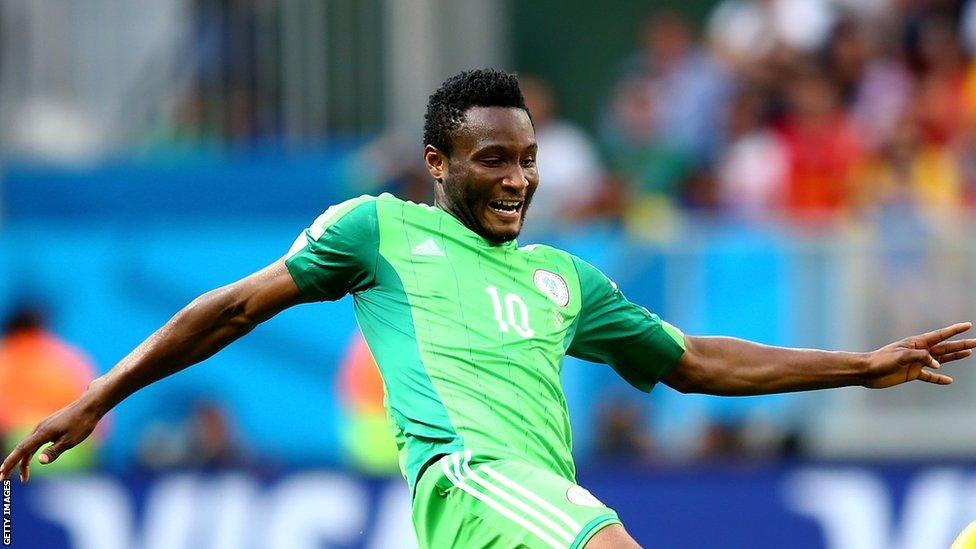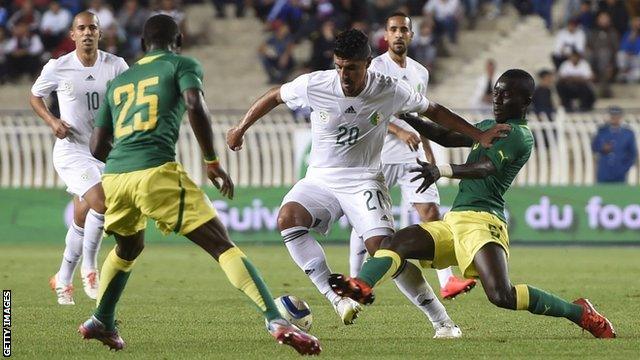African men target third football gold at Rio Olympics
- Published

John Mikel Obi has 75 caps for the Nigeria senior team
Africa's men go into the Rio Games looking for a Olympic football gold.
Nigeria won the title at the 1996 games in Atlanta, with Cameroon equalling their feat four years later in Sydney.
African U-23 champions Nigeria, Algeria and South Africa are the three countries representing Africa in men's football in Brazil.
BBC Sport previews the continent's chances of conjuring another gold medal performance.
Nigeria:
Etebo Oghenekaro scored five goals to emerge as top scorer as Nigeria conquered the continent at the Under-23 Africa Cup of Nations in Senegal last year to seal a seventh appearance at the Olympics.
Experienced Chelsea midfielder John Mikel Obi will lead his country's charge for success in Brazil, two years after playing all four games as the Super Eagles reached the 2014 World Cup second round in South America.
The 29-year-old Nigeria captain is one of the squad's permitted quota of three players over the age limit of 23.
With many clubs not releasing players, goalkeeper Daniel Akpeyi who plays in South Africa, is the only other over-aged player on the Nigeria list for the Games.
Watford's Odion Ighalo, Kelechi Iheanacho of Manchester City and Arsenal's Alex Iwobi miss out having not been released by their clubs.
Established senior internationals William Troost-Ekong, Kingsley Madu, Abdullahi Sheu and Umar Aminu are in the final squad.
However, the team has endured adversities to reach Rio after battling with unpaid allowances and lack of football kits.
Coach Samson Siasia has been working without salary since January, alongside his assistants, but insists he is focusing on the challenges on the pitch and not off it.
"I have absolutely no control over our financial situation and those problems," Siasia told BBC Sport.
"Our immediate focus is on the football. We have sacrificed a lot of things to get here and we can't move forward if we keep looking back at what we've lost.
"We have three teams in our group highly motivated to stop us but our job is to show why we are the African champions and one of the favourites to win a medal in Rio."
Nigeria, who are pitted in Group B of the Rio games alongside Sweden, Colombia and Japan, boast a proud Olympics record.
They made Olympic football history in 1996 by becoming the first African and non-European and South American team to win the gold medal.
They also finished runners-up at the 2008 Beijing Olympics, where current under-23 coach Siasia also coached the 'Dream Team' in China.
However, the so-called 'Dream Team V', led by Austin Eguavoen, failed to qualify for the 2012 London Olympics after crashing out in the group stages of the 2011 U-23 championship in Morocco.
They will begin their campaign against Japan on the opening day, then play Sweden before wrapping up their group match against Colombia.
Algeria:

Baghdad Bounedjah (centre) in action for Algeria in a friendly against Senegal
Algeria, drawn in Group D with Honduras, Argentina and Portugal, are going to the Olympic Games for only the second time in their history.
Their first appearance came in Moscow 1980, where they reached the quarter-finals only to lose 3-0 to Yugoslavia.
Disciplined and compact, the young Desert Foxes were edged 2-1 in the final of the qualifying tournament by Nigeria.
Swiss coach Pierre-Andre Schurmann has kept faith in 13 players from the squad which finished as runners-up in Senegal.
There was intense speculation in the local media that Yacine Brahimi and Islam Slimani could both be drafted in the 18-man squad for Rio.
But Qatar-based striker Baghdad Bounedjah and MC Alger defender Abdelghani Demmou are the only two players over the age limit of 23 to be included.
Algeria will look to inspirational goalkeeper Abdelkader Salhi for cover at the back but Zinedine Ferhat, who scored twice at the qualifying tournament, misses out after completing his switch to French side Le Havre from USM Alger.
Algeria may be Africa's top-ranked senior team, but the Olympic-bound team have failed to sparkle during their recent training camp in Spain.
The team drew their two preparatory matches against Valencia and Granada but coach Schurmann, 56, insists he took only positives from both games.
"It was important to give all 18 players a chance to play at a competitive level," said Schurmann.
"We had no injuries and all the players are quite aware of what to expect in a tough group awaiting us in Rio.
He will be hoping strikers Ben Tahar Meziane, Zakarya Haddouche and Mohammed Benkablia will score the goals that can fire the team out of the group.
They will open their campaign against Honduras before facing 2008 gold medallists Argentina and Portugal in tricky fixtures.
South Africa:
The Amaglug-glug beat hosts Senegal in a nervy penalty shoot-out in the third place play-off to land in Rio.
South Africa, who have been drawn in Group A along with Brazil, Iraq and Denmark, will be making their second appearance at the Games after their debut at the 2000 Sydney Olympics.
They will open against the hosts and 2012 silver medallists Brazil, before battling Denmark and Iraq for a spot in the next round.
Coach Owen da Gama can draw strength from their famous 3-1 win against Brazil at the Sydney Games but he needs no reminder that it only served as a moral victory after the country missed out on a place in the knockout stages.
Experienced goalkeeper Itumeleng Khune and Eric Mathoho are the two players over the age limit of 23 included in the squad.
Also in the squad are the overseas-based Lebogang Mothiba of Lille in France and Tyroane Sandowns who plays for Gremio in Brazil.
Da Gama, who has significantly reshuffled his pack, is confident that the players he has selected will write their names in the book of history.
"The technical team is very pleased with the balance in the squad, and the fact that we have five or six versatile players makes the squad stronger," he said.
"We felt it necessary to limit the number of overage players, just so that we could make provision for another Under-23 player."